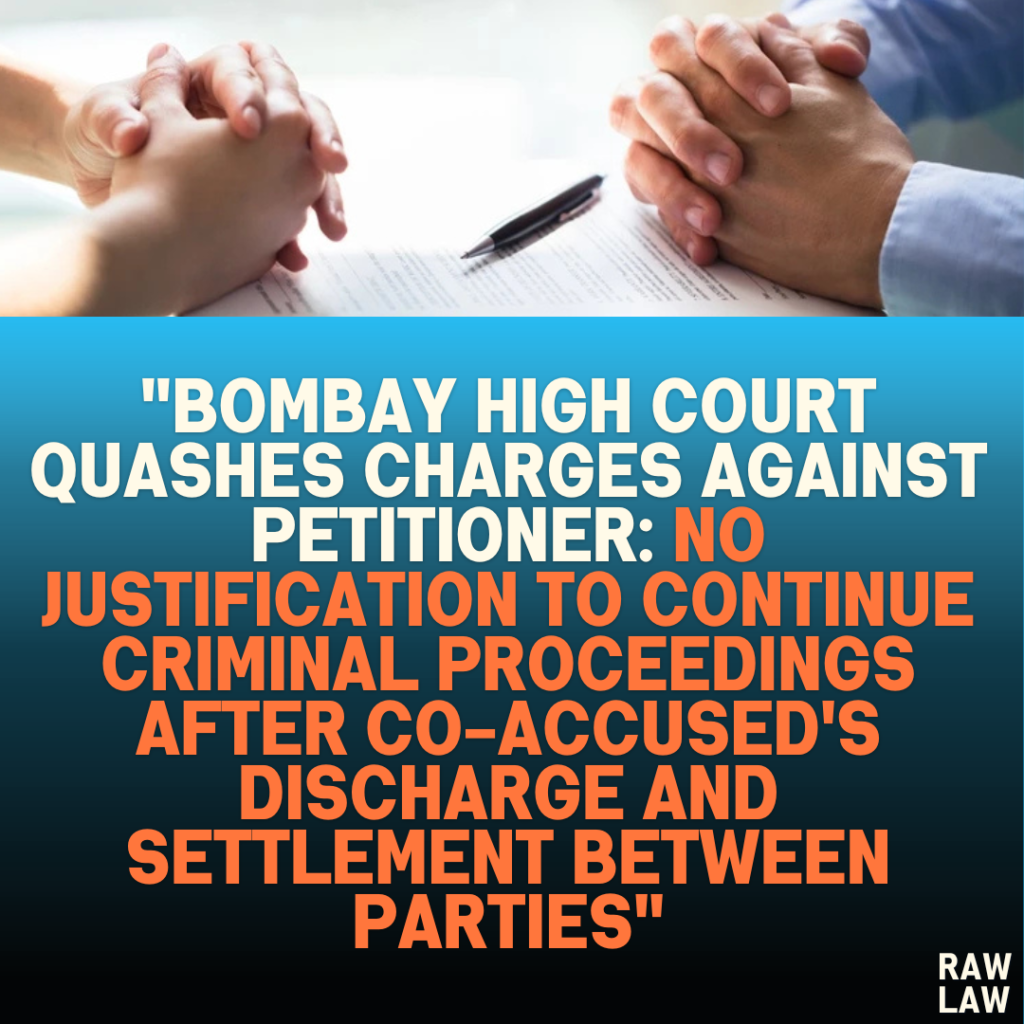Court’s Decision:
The Bombay High Court allowed the writ petition filed by the petitioner challenging the order of the Additional Metropolitan Magistrate, 40th Court, Girgaon, Mumbai, which had earlier rejected the discharge application filed by the petitioner in Case No. 298/PW/2018. The High Court quashed the impugned order and discharged the petitioner from the said case. The court noted that the matter between the parties had been settled, and the petitioner was required to pay a cost of Rs.15,000/- to the Central Police Welfare Fund.
Facts:
- The petitioner was charged along with her husband under Sections 341, 354, and 509 read with Section 34 of the Indian Penal Code, 1860.
- The allegations were made by Respondent No. 2, who claimed that the petitioner and her husband outraged her modesty when they demanded a salary payment.
- The complaint was primarily based on an altercation that occurred between the parties, and the entire incident was captured in CCTV footage.
- The petitioner filed a discharge application arguing that there was no substantive evidence to indicate her involvement in the alleged crime.
- The application was rejected by the Additional Metropolitan Magistrate, leading the petitioner to file the present writ petition before the High Court.
Issues:
- Whether the petitioner could be discharged from the case based on the lack of evidence presented in the charge-sheet.
- Whether the settlement between the parties and the prior discharge of the co-accused (the husband of the petitioner) warranted the quashing of the impugned order.
Petitioner’s Arguments:
- The petitioner argued that the complaint filed by Respondent No. 2 was false and arose from a dispute over the demand for salary.
- It was contended that the husband of the petitioner, who was a co-accused in the case, had already been discharged by the High Court in a similar writ petition.
- The petitioner further submitted that the matter was settled between the parties, and the complainant had no objection to the petition being allowed.
- The petitioner emphasized that the trial court had failed to consider the documents and evidence on record while rejecting the discharge application.
Respondent’s Arguments:
- The State (Respondent No. 1) argued that there was a prima facie case against the petitioner, as indicated by the contents of the FIR.
- The complainant (Respondent No. 2) concurred with the petitioner’s counsel, confirming that the matter had been resolved and the petitioner had tendered an apology.
- Consent terms were tendered by the complainant’s counsel, which were taken on record and marked as ‘Article-X’ for identification.
Analysis of the Law:
The court examined the legal position concerning the quashing of criminal proceedings in cases where parties have settled the matter. The court noted that when a matter is primarily of a personal nature and the complainant has settled the dispute, the continuance of criminal proceedings would serve no purpose. The court referred to the principles laid down by the Supreme Court regarding quashing of proceedings under such circumstances and emphasized the need for courts to adopt a lenient approach.
Precedent Analysis:
The petitioner cited the precedent established in her husband’s case, where a similar writ petition had resulted in his discharge from the offenses. The High Court, in that instance, had observed that the nature of the allegations and the settlement between the parties warranted the quashing of proceedings. The same rationale was applied to the present case.
Court’s Reasoning:
The court observed that the primary allegations in the FIR were against the petitioner’s husband, who had already been discharged by this Court. Given that the co-accused had been absolved of the charges and the matter was settled between the parties, it would be unjust to continue the criminal proceedings against the petitioner alone. The court further held that the trial court’s order was not in consonance with the evidence on record, as there was no material to implicate the petitioner independently.
Conclusion:
The High Court quashed the order of the Additional Metropolitan Magistrate dated 28th February 2024 and discharged the petitioner from the said case. The court directed the petitioner to pay Rs. 15,000/- to the Central Police Welfare Fund as a token of good faith, considering the settlement between the parties.
Implications:
This judgment reinforces the principle that in cases involving personal disputes which have been amicably settled, the continuation of criminal proceedings would serve no purpose. It highlights the court’s inclination to allow quashing of proceedings when the dispute is of a private nature and has been resolved between the concerned parties. Additionally, it sets a precedent for similarly situated co-accused seeking discharge on the grounds of parity and settlement.
